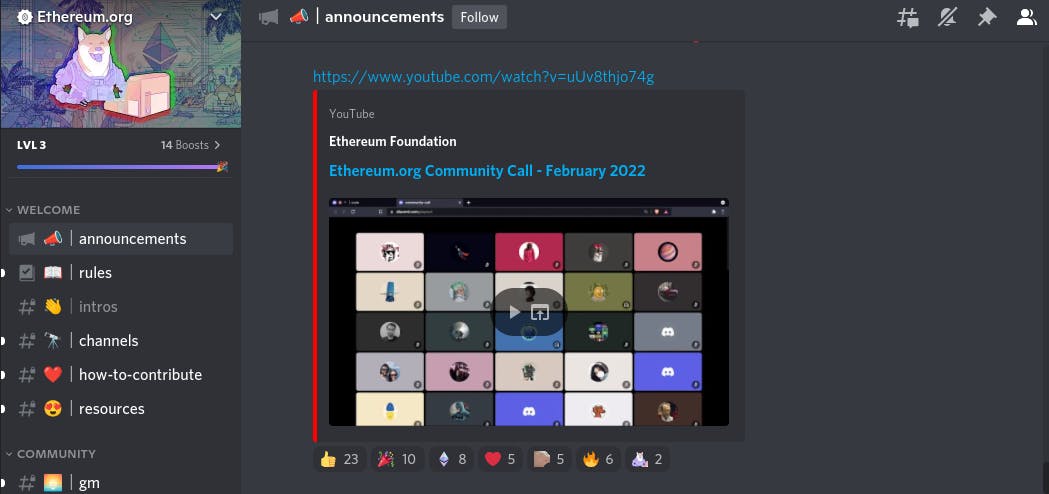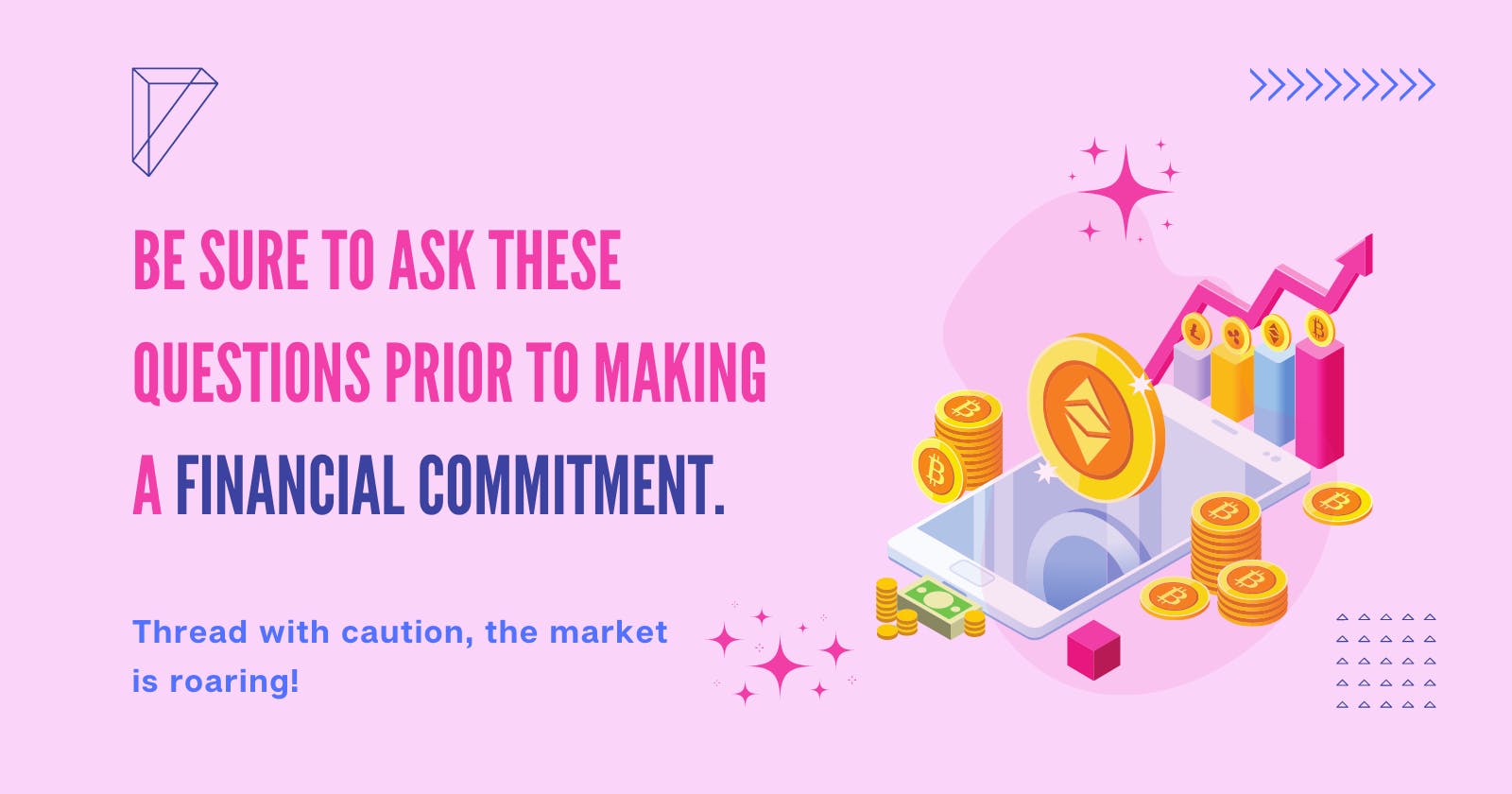What Should You Know Before Investing in Blockchain Technology?
This post aims to limit the amount of money lost due to ignorance by providing a list of four(4) key questions to ask.
Table of contents
- 1. Is it a solution to your problem, and if so, how?
- 2. What are the specifics of the project's technical details?
- 3. Do you know anything about the project's history, and do you think it will hold up to scrutiny in the future?
- 4. Who are the product's founders, and is there a large support community behind them?
- Conclusion
- Learn More
The blockchain has the potential to create the most wealth in human history.
In addition to helping the disadvantaged and the less powerful, technology has the potential to benefit everyone.
Many people have made more money in a few hours by sitting at a computer and making the right or wrong selections, whether it's with NFTs, Defi, DAOs, or cryptocurrency trading.
When working with the blockchain, all you need is an understanding of the industry, and some money you're prepared to risk in order to make money.
However, dealing with the blockchain is not completely risk-free since there are both purposeful and inadvertent bad actors attempting to exploit the technology's infancy and the inexperience of its users.
Misinformation and disregarding a specific project are two of the most prevalent reasons people lose money while dealing with blockchain.
I've compiled a list of the four most crucial questions anyone interested in working with the blockchain should ask themselves in order to limit the rate at which people lose their hard-earned money due to ignorance.
Flipping NFTs, buying and hodling tokens, supplying liquidity, engaging in DeFi, joining a DAO, and other strategies can all be viable options for making money in the cryptocurrency space.
This article's points are broad and can be applied to any blockchain venture you'd like to invest in.
1. Is it a solution to your problem, and if so, how?
Because of its promise to solve problems, this technology is being used by a growing number of people.
The Blockchain and Web3.0 remove all of the crap from the current web and its characteristics by delivering secure and trustless solutions. Transparency is given to us.
The security and trust issues raised by the blockchain can be addressed in a variety of ways. A linear and chronological order is maintained for new blocks, and new blocks are stored in a linear and chronological order (always added to the end of the blockchain).
To update the contents of a block that has been added to the end of the blockchain, all users must agree that the modification is necessary.
All of them are general solutions to issues that we've previously encountered.
As soon as the desire to put money in arises, you must tailor the solutions to fit your own needs.
Take a look at your life and see if there are any issues that the venture can help you with. When consumers invest in something because of the buzz, they're making a tremendous mistake.
The ideal method is to have a general overview of the project, what it has previously accomplished, and what it intends to do.
To give you an example, here it is: Because Ethereum has reached Turing completeness, programmers can now create smart contracts and Dapps. First and foremost, make it all about you.
The next step is to explore Dapps as a viable project to invest in once you have a general idea of how they will impact your life and those around you.
2. What are the specifics of the project's technical details?
The answer to this issue isn't going to be easy, especially if you don't have any expertise in technology. There are several threats to technology as it advances.
Millions of dollars have been lost as a result of high-profile phishing attempts and smart contract re-entrancy assaults.
For a technical individual, having a personal engagement and examination of the project stack is recommended.
You should know the project's strengths and weaknesses, as well as any possible vulnerabilities. It's important to know how the project was built and if the code has been adequately tested.
If you have that kind of knowledge, you can go a step further and investigate and audit the code. Because you're putting money into the project, you should do as much research as possible and pay attention to every little detail.
If you are a non-technical person, I recommend that you go through the trouble of finding a reliable and knowledgeable engineer to serve as your technical advisor or consultant.
When you have a lot of money, it's a good idea to hire and pay experts.
It's difficult to create solutions for the chain, and most efforts are open to attack. Do your homework and take a deep breath. It will all pay off in the long run!
3. Do you know anything about the project's history, and do you think it will hold up to scrutiny in the future?
This is my absolute favorite part.
"If you want to predict the future, study the past", according to Confucius.
Predicting the future is a lot easier if you examine history. As far as technology is concerned, this has been demonstrated to be true.
As a result, it's critical to keep an eye on the project's previous controversies. Has it been subjected to any tampering? What's going on with the project, in your opinion? How did it do in the wake of a big setback?
With all of these inquiries, you gain a better understanding of what it has accomplished thus far, as well as its long-term goals.
In the case of a blockchain project, it's especially concerning when there are no unfavorable reviews online. Before believing something that looks glistening and impossible to believe, pause and reflect on your assumptions about history.
There were around 11,000 investors who contributed $150 million to Ethereum's early years in what is arguably one of the largest crowdfunding campaigns ever. It was then hacked!
In order for the founders to get their hands on the money, they had to run a hard-fork on the project. What appears to be a straightforward story becomes more complicated when you look at the specifics. In the wake of the hack, a lot of questions have been answered and new information has been learned.
Before committing your money to a project, you should be aware of and grasp all of the facts, including the ones that are difficult to bear.
This is a good thing to keep in mind when investing in NFT projects, the markets that go with them, and phishing attacks.
4. Who are the product's founders, and is there a large support community behind them?
In order to wrap up your investigation and verify all of your findings, you should ask this question.
By putting in an additional effort, you can learn more about the project's developers and founders. Try to get to know the people behind the initiative, their motivations, and their plans for the future.
It's also important to assess the health of the community. Community is everything in the blockchain industry, and it may reveal a lot about a project.
Also, it's a terrific opportunity to meet people who share your interests and learn more about a topic.
Connect with others via Reddit discussion boards or Discord chatrooms. You'll learn things about the projects that you didn't know before.

Conclusion
As technology advances, it becomes increasingly exciting to be a part of this fascinating era.
However, the largest investment mistake you can make is to invest in something you don't understand.
I'm not a financial expert, and all of the things above are based solely on my personal experience and findings.
Learn More
This blog is dedicated to educating curious individuals who want to learn about technology and improve their skills.
Check out the blog to show your support.

